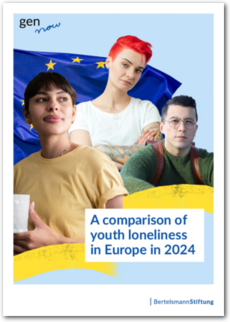Loneliness is an unpleasant feeling that people experience when their actual social relationships do not match what they desire or need.
Loneliness – an ongoing trend
Based on an eupinions survey, our new study finds that young adults in Germany and the EU are lonelier than older adults. In the German sample, 51% of young adults are at least moderately lonely (12% are severely lonely), compared to 37% of older adults aged between 36 and 69 (12% of whom are severely lonely). Young adults in the EU-wide sample are on average even lonelier than adults in this age group in the German sample, with 57% experiencing at least moderate loneliness (17% of which is severe). Across the EU, 47% of older adults in the sample are at least moderately lonely (17% severely lonely).
The analysis thus shows that the trend of high loneliness among young people in Germany, which has existed since the Covid-19 pandemic, is continuing and also persists throughout the EU.
“Loneliness can weaken the feeling of belonging to society and thus also become a societal and political problem. This is precisely why we should address loneliness together as a society and not stigmatize those affected.” Leander Berner, Bertelsmann Stiftung
Loneliness - a question of country?
Although loneliness is an issue among young people throughout the EU, there are some noticeable differences between the member states. According to the sample, young people in France are particularly lonely: 40% of young French people are moderately lonely, 23% of them even severely lonely. This means that almost two thirds of young people in France are affected by loneliness. These are the highest figures among the seven EU countries that allow meaningful comparisons to be made due to the sample size. While moderate loneliness is lowest in Germany, young Dutch people are the least affected by severe loneliness.
Loneliness - a question of education?
Both in the German sample and among the EU-average respondents, loneliness is particularly pronounced among people with a low level of educational attainment. There are various reasons for this discussed in the academic debate: On the one hand, it is assumed that people with a higher level of educational attainment generally have more opportunities to cope with stress and are able to maintain more social relationships and cultivate them better. On the other hand, higher educated people often have a better income and can therefore participate more extensively in social life.
Recommendations to combat loneliness
“To effectively reduce loneliness among young people, it is crucial to systematically and engagingly include their perspectives in policy consultation processes. By actively involving young people in the design and implementation of initiatives, we create solutions that truly meet their needs and help them feel less isolated.” Dr. Anja Langness, Bertelsmann Stiftung
Especially severe and chronic loneliness is perceived as a problem by those affected. In our study, we present various recommended actions to oppose this: Comprehensive monitoring, focusing in particular on young people, international learning and strengthening social and emotional skills can help to reduce loneliness.






